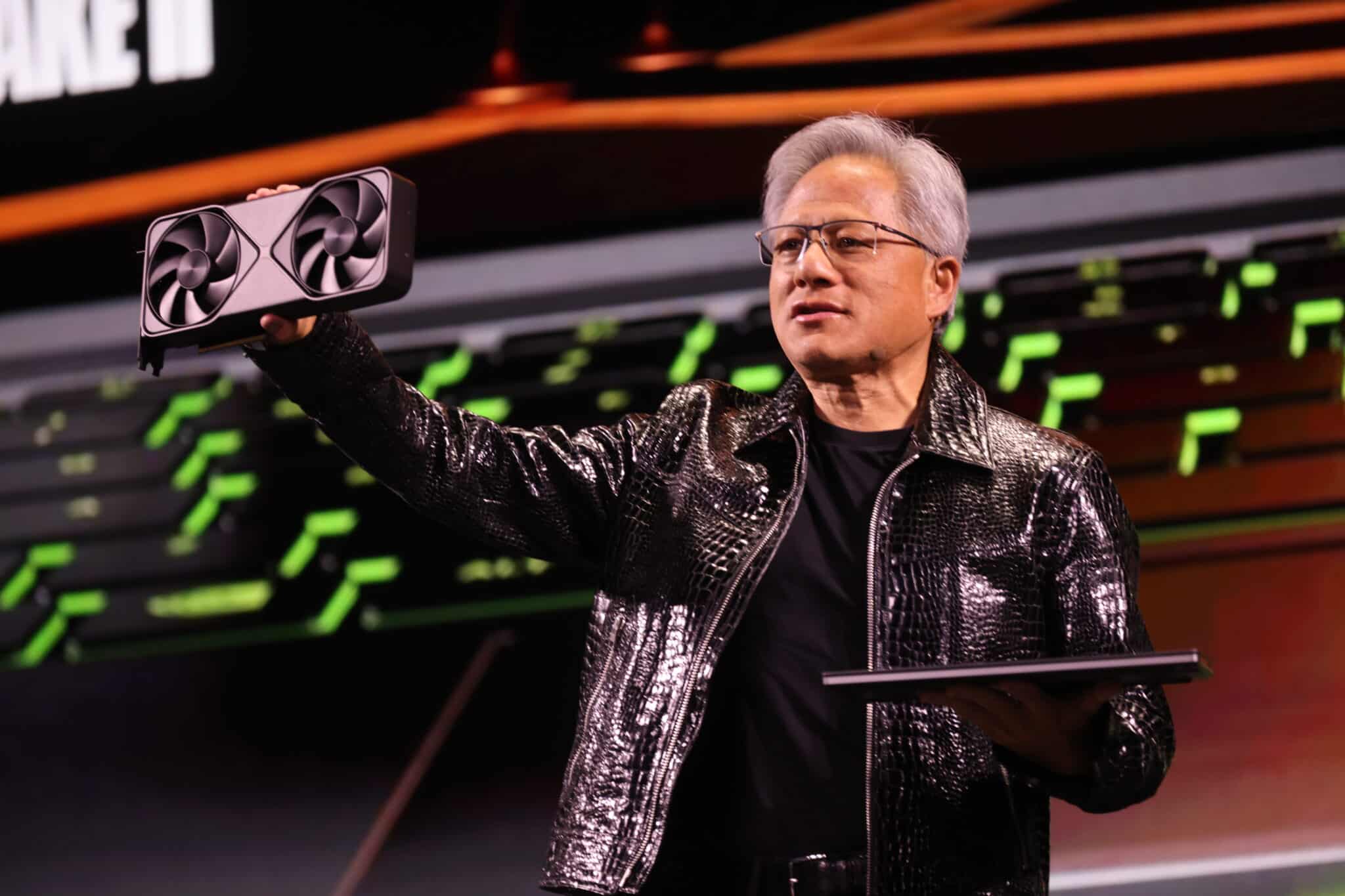NVIDIA CEO’s Predictions Rain on Quantum Stock Parade

Insider Brief
- NVIDIA CEO Jensen Huang’s prediction that “very useful” quantum computers are likely 20 years away has been linked to a sharp drop in quantum computing stocks, with companies like IonQ and Rigetti experiencing significant after-hours losses.
- Huang’s remarks align with NVIDIA’s strategy of focusing on a hybrid quantum-classical era and reflect the company’s collaboration between quantum processors and classical systems to tackle complex computational tasks.
- While the statement might seem conservative, it is not too far off current industry roadmaps, which foresee practical quantum advancements within the next decade and fault-tolerant quantum supremacy further down the line.
- Image: Jensen Huang… not holding a very useful quantum computer. (NVIDIA)
Financial media are blaming NVIDIA CEO Jensen Huang’s predictions about quantum computing’s eventual maturity for a pullback among many quantum stocks yesterday.
In a question-and-answer session with analysts, Huang said that “very useful” quantum computing was a few decades away.
“If you kind of said 15 years for very useful quantum computers, that would probably be on the early side. If you said 30, it’s probably on the late side,” Huang told the analysts, Investor’s Business Daily (IBD) reported. “If you picked 20, I think a whole bunch of us would believe it.”
As a result, the financial news service reported that quantum computing stocks — including IonQ (IONQ), Rigetti Computing (RGTI), D-Wave Quantum (QBTS) and Quantum Computing (QUBT) plunged after Nvidia (NVDA) — plunged. IonQ and Quantum Computing Inc. dropped more than 16% after hours while D-Wave Quantum Inc. and Rigetti Computing Inc. fell more than 14%, according to IBD.
The news may have come as a shock to investors because NVIDIA seemed to be a champion of quantum computing, recently signing a number of key deals with quantum players. NVIDIA announced it is working with Google Quantum AI to accelerate the design of its devices in November, for example, while using the recent SC24 to publicize a long list of partnerships with quantum companies, like Anyon Technologies, IonQ and a range of others.
However, parsing Huang’s words a bit, the statement does not seem to reflect a new stance on quantum and, in fact, aligns tightly with NVIDIA’s overall quantum strategy. The predictions — again depending on the exact meaning of Huang’s phrasing and its alignment with definitions among the quantum industry– seem to also jibe with most quantum roadmaps already in the books, although admittedly more on the conservative side.
Very Useful or Just Useful?
First, there’s a need to parse “very useful” part (particularly that “very” part) — which might suggest a standalone, universal fault tolerant machine — of Huang’s prediction. Most current roadmaps see that universal machine as the ultimate destination in a process of iterations leading to devices that deliver more and more practical uses.
While the industry has yet to agree on official terminology, the process usually starts with scientific advantage — a quantum or hybrid system that can perform a scientific task more efficiently than a purely classical counterpart; then, practical quantum advantage — a quantum or hybrid system that can perform a task more efficiently than a purely classical counterpart; then quantum advantage — a quantum system that can perform a task much more efficiently than a classical computer or supercomputer. Eventually, there’s quantum supremacy, which would be like the result delivered by Google’s Willow chip, but in a practical, real-world task rather than the recent random circuit sampling (RCS), which is a benchmarking test.
If so — and it’s important to reiterate that every entity probably defines these terms and their manifestations a bit differently — Huang’s predictions are close to most roadmaps that see the beginning advantage about five years out with those other levels hitting in successive intervals after that — so ten to fifteen for quantum supremacy in 15 years is not as outlandish as it might seem.
The Hybrid Future
It’s also important to consider that NVIDIA’s quantum strategy is built around a lengthy “hybrid quantum” era when quantum computers and classical computers work in collaboration based on tasks each is better at handling. One might add that the quantum strategy is existentially built around that concept.
Last year, Huang outlined the case for NVIDIA’s role in this hybrid quantum relationship at GTC 2024, Motley Fool reports.
Huang told the crowd: “We should be a great partner for the quantum computing industry. How else are you going to drive a quantum computer? To have the world’s fastest computer sitting next to it? And how are you going to simulate a quantum computer, emulate a quantum computer? What is the programming model for a quantum computer? You can’t just program a quantum computer all by itself. You need to have classical computing sitting next to it. And so the quantum would be kind of a quantum accelerator. … Who should go do that? Well, we’ve done that.”
Numerous quantum experts, including Dr. Bob Sutor, of the Futurum Group, see that the future will always be hybrid based on the nature of quantum computing’s ability to excel at certain tasks while being theoretically useless at other ones.
In any case, for NVIDIA, the longer the hybrid quantum era, the better. In fact, a standalone quantum device in a few years might put NVIDIA out of business in quick order.
Ultimately, then, Huang’s predictions don’t seem to be knock on quantum computing in general — which Huang reportedly “loves” — nor does his statement appear to reflect any change in NVIDIA’s strategy to support quantum companies in this hybrid quantum vision.
